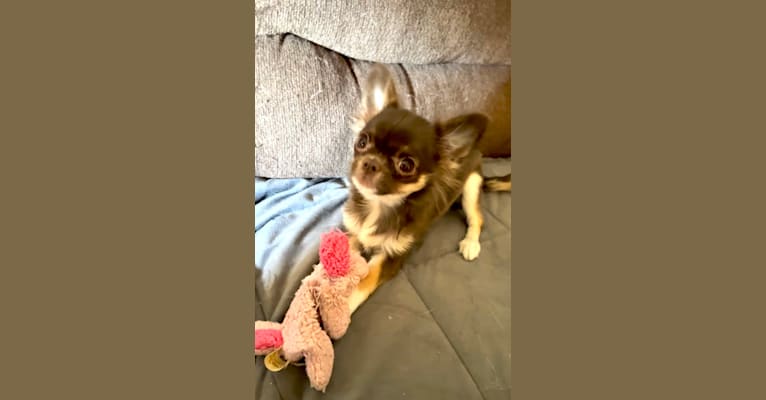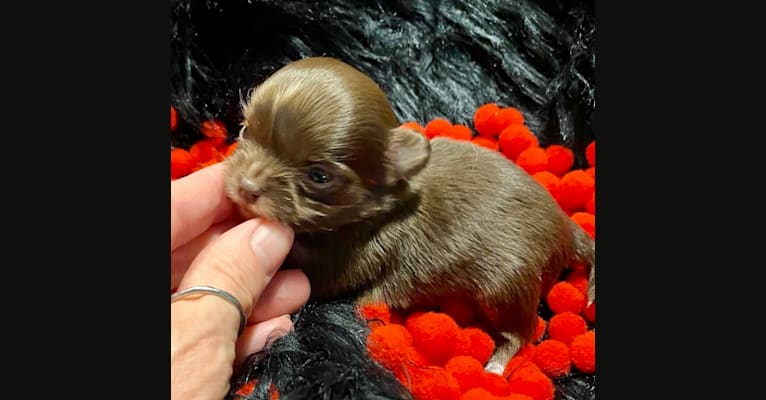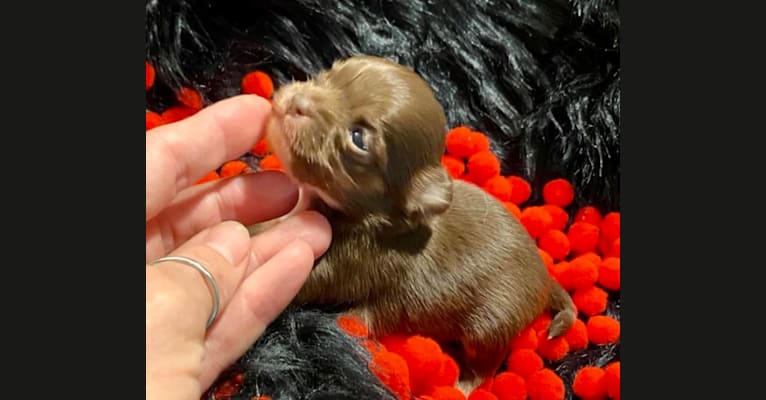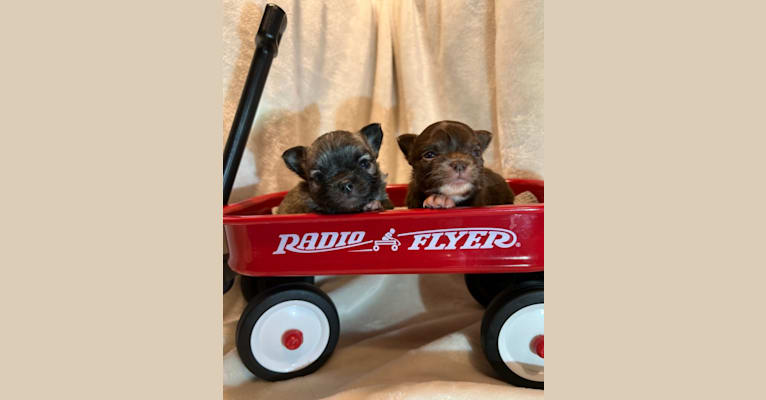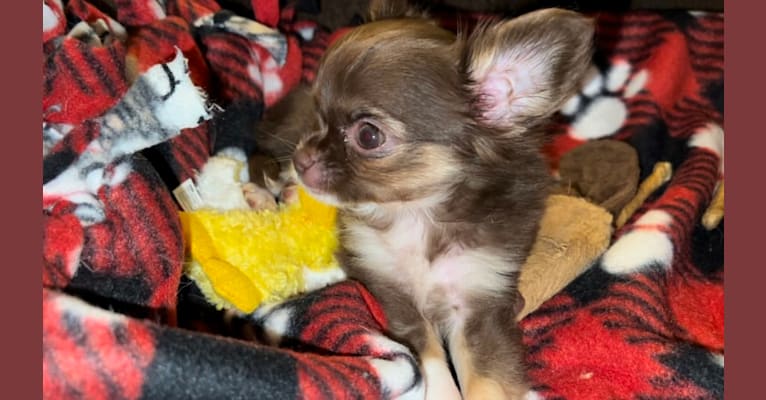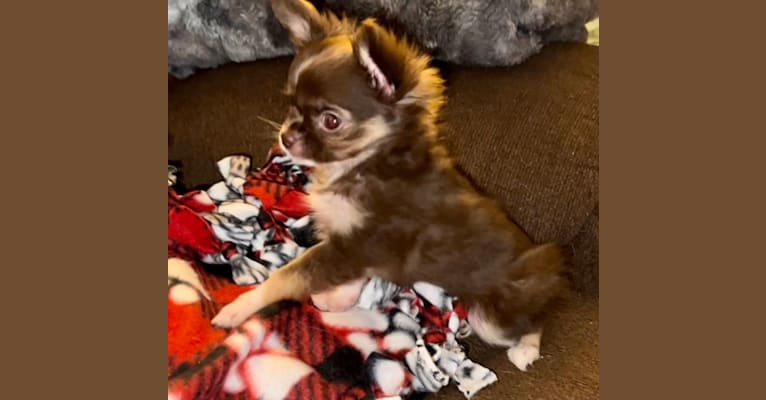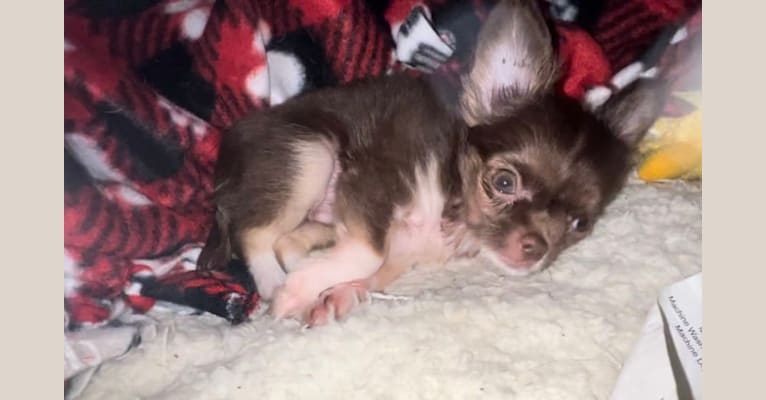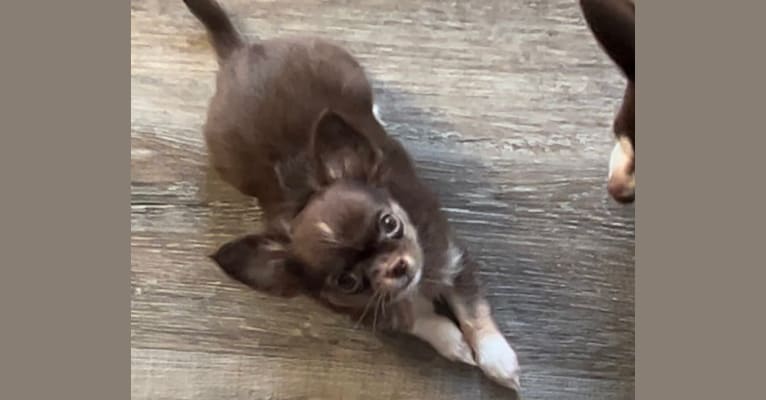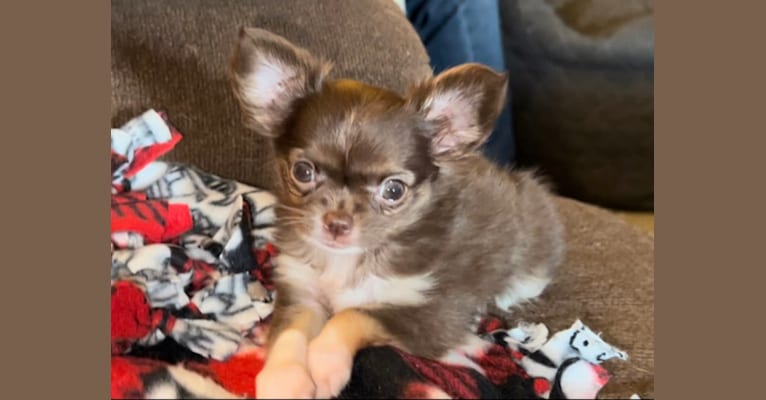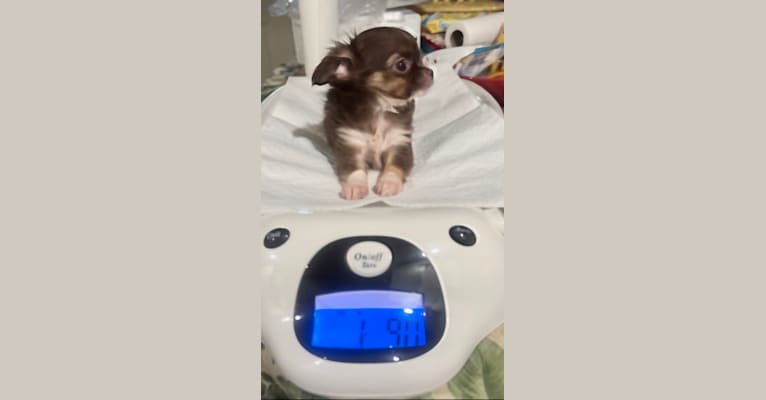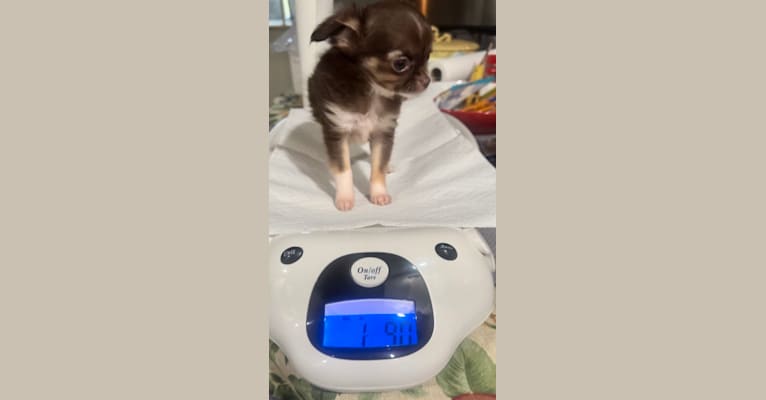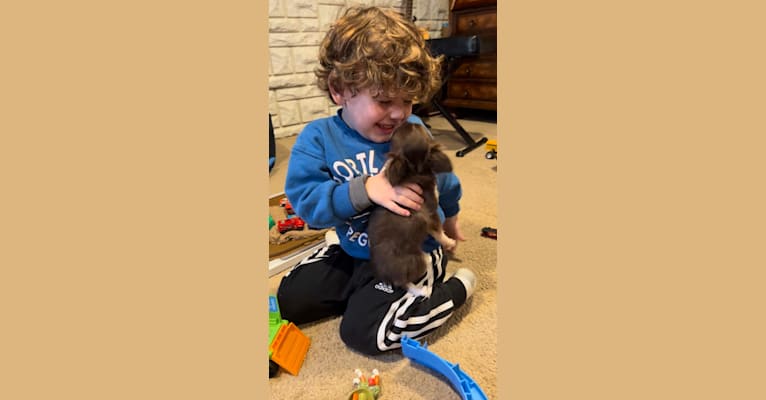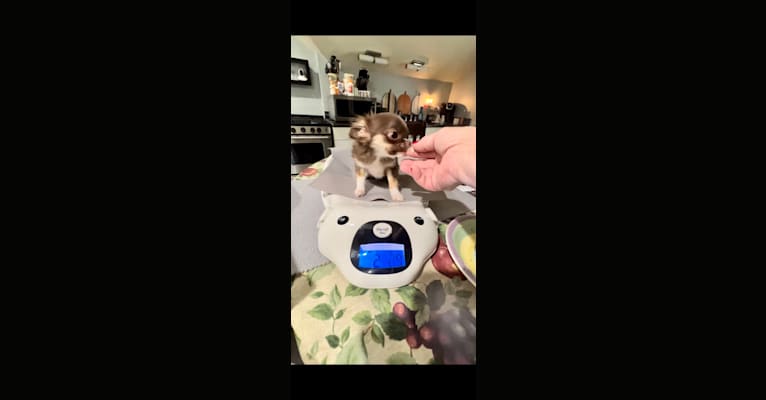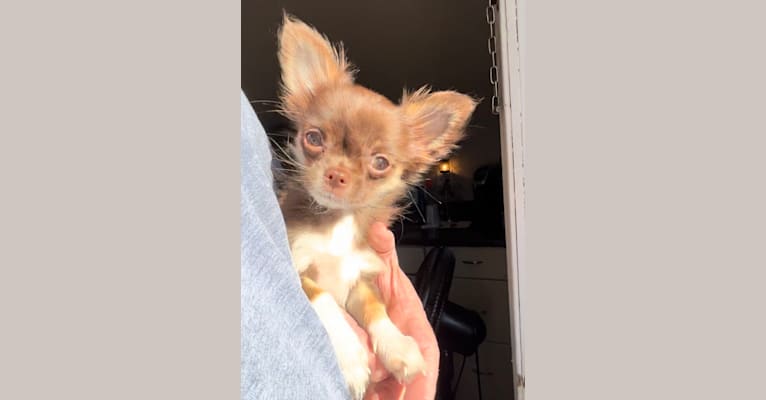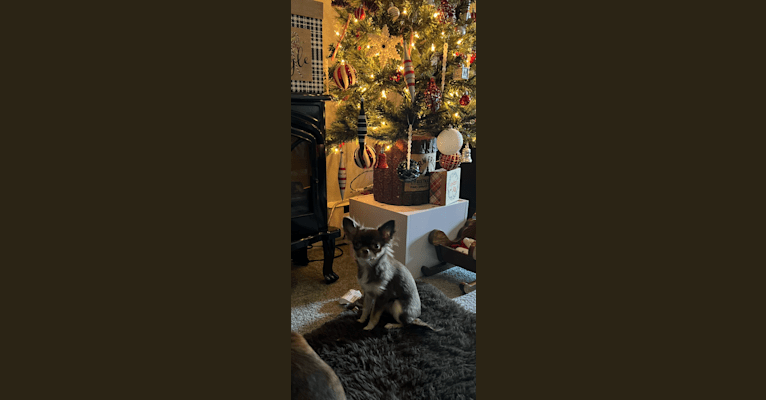Kiwi inherited both copies of the variant we tested
No Dogs Available
It looks like you don’t have any dogs on your account yet. Activate a kit now!
Genetic Age
Please note that genetic age is different from calendar age. We can now estimate your dog's calendar age with the Embark Age Test.
The genetic age in this report is an estimation of where your dog is in his or her healthspan. Dogs age at very different rates due to a number of genetic and environmental factors. Body size is a strong genetic influence: for example, a seven year old Great Dane is at the start of his golden years, but a seven year old Pomeranian is just learning what "slow down" means. Just within this example, you can see that the old "one doggie year = seven human years" adage isn’t going to work. And yet, knowing your dog’s age is important: it informs what your dog needs as far as food, frequency of veterinary checkups, and exercise. So how do you best determine how old your dog is?
Embark's genetic age feature calculates how old your dog would be if he or she were aging at an average human rate (using humans in the USA as the baseline). So going back to our Dane/Pom example, we'd estimate a seven year old Great Dane at about 80 years old (senior citizen), but a seven year old Pom would be about 42 (adult). Makes way more sense, right?
| Calendar age | Genetic age |
|---|---|
| 1 year | 18 human years |
| 2 years | 25 human years |
| 3 years | 30 human years |
| 4 years | 35 human years |
| 5 years | 40 human years |
| 6 years | 45 human years |
| 7 years | 50 human years |
| 8 years | 55 human years |
| 9 years | 60 human years |
| 10 years | 65 human years |
All we need from you is a calendar age. It's okay if this is an estimation: it is just a starting point. We then factor in your dog's breed composition, information at certain genes that affect size, and their inbreeding coefficient to calculate genetic age. Like in humans, in dogs females tend to live longer than males (so an “80 year old” female dog = 80 year old woman). Exercise and diet also play a role in how long your dog will live. Nevertheless, genetic age is the primary risk factor for numerous diseases in dogs, including cancer, kidney disease, osteoarthritis, cataracts, cardiac disease and cognitive decline. It can help you and your vet know what you should feed your dog, what screenings to get, and other aspects of your dog’s care.
Wolfiness score
How wolfy is my dog?
Most dogs have wolfiness scores of 1% or less. We find populations and breeds with higher scores of 2-4% occasionally, and unique dogs with scores of 5% or above more rarely.
What it means for my dog
Your dog’s Wolfiness Score is not a measure of recent dog-wolf hybridization and does not necessarily indicate that your dog has some recent wolf ancestors. (If your dog has recent wolf ancestors, you will see that in the breed mix report.) Instead, the Wolfiness Score is based on the number of ancient genetic variants your dog has in our unique Wolfiness marker panel. Wolfiness scores up to 10% are almost always due to ancient wolf genes that survived many generations, rather than any recent wolf ancestors. These ancient genes may be a few thousand years old, or may even date back to the original domestication event 15,000 years ago. They are bits of a wild past that survive in your dog!
The science
Your dog’s Wolfiness Score is based on hundreds of markers across the genome where dogs (or almost all of them) are the same, but wolves tend to be different. These markers are thought to be related to "domestication gene sweeps" where early dogs were selected for some trait. Scientists have known about “domestication gene sweeps” for years, but do not yet know why each sweep occurred. By finding rare dogs carrying an ancient variant at a certain marker, we can make associations with behavior, size, metabolism, and development that likely caused these unique signatures of “doggyness” in the genome.
Predicted Adult Weight
How does weight matter?
For people with puppies, you probably want to know how big of a crate to buy or just how big to expect your dog to become. But genetic weight is also useful for people with fully grown dogs. Just like with people, overweight and obese dogs suffer reduced length and quality of life. They can develop chronic health conditions and suffer from limited mobility and other issues. While over half of American dogs are overweight or obese, fewer than 15% of their owners realize it. By comparing your dog’s weight to their genetic predicted weight you have one more piece of information about their ideal weight. With this and other pieces of information like weight history and body condition, you and your veterinarian may want to discuss your dog’s diet, exercise, and weight control plan to give your pup the longest, healthiest life possible.
How do we predict weight?
Our test is the only dog DNA test that provides true genetic size not based just on breed ancestry but based on over a dozen genes known to influence a dog’s weight. It uses the most advanced science to determine your dog’s expected weight based on their sex, the combination of these genes, and breed-specific modifiers.
How accurate is the predicted weight?
Unlike in people, healthy weight in dogs is controlled largely by only a few genes. Our algorithm explains over 85% of the variance in healthy adult weight. However, due to a few as-yet-undiscovered genes and genetic interactions that affect size, this algorithm sometimes misses. Occasionally it misses by a fairly large amount especially when a dog has a breed with an unknown size-influencing gene. If we have missed your dog’s weight, your dog may be a scientific discovery waiting to happen! Please be sure to go to the Research tab and complete the Getting to know your dog survey, where you can answer questions about your dog’s current weight and body shape. This information will inform our ongoing research into the genetics of size and weight in dogs.
Haplotypes
Revealing your dog’s ancient heritage
Haplotypes are particular DNA sequences that are inherited entirely from a dog’s mom (maternal) or dad (paternal).
Because they are inherited whole, your dog and his or her mom share the exact same maternal haplotype. If you have a male dog, your dog and his dad share the exact same paternal haplotype (female dogs don’t inherit paternal haplotypes).
Because most breeds were started with only a few individual dogs, many breeds are dominated by only one or a few haplotypes.
Haplogroups
Revealing your dog’s ancient heritage
Haplogroups are groups of similar DNA sequences (called haplotypes) that are inherited entirely from the mother (maternal) or father (paternal) and don’t get shuffled up like other parts of your dog’s genome.
These groups all originally descend from one male or female wolf, usually one that lived tens of thousands of years ago. Because they are inherited whole and not shuffled like other DNA, they can be used to trace the ancestral routes that dogs took around the globe en route to your home.
Only male dogs have paternal haplogroups because they are determined by the Y chromosome, which only male dogs have. Both males and females have maternal haplogroups, which come from a part of DNA called the mitochondrial DNA.
Breed analysis
Breed analysis is based on comparing your dog’s DNA with the DNA of dogs from over 350 breeds, types and varieties.How are Kiwi's ancestors represented in her DNA?
All dogs are related and share some DNA. Siblings share lots of their DNA (half of it in fact), cousins share a bit less (an eighth), and so on. Because dog breeds are made up of a closed group of dogs, all dogs in that breed share a lot of their DNA, typically about as much as second cousins, though it varies by breed. Different breeds that are closely related share somewhat less DNA, and dogs from very different breeds share even less DNA (but still much more DNA than either dog shares with a cat).
DNA is inherited in pieces, called chromosomes, that are passed along from parent to offspring. Each generation, these chromosomes are broken up and shuffled a bit in a process known as recombination. So, the length of the segments your dog shares with her ancestors decreases with each generation above her: she shares longer segments with her mom than her grandma, longer segments with her grandma than her great-grandma, and so on.
How does Embark know which breeds are in Kiwi?
We can use the length of segments Kiwi shares with our reference dogs to see how many generations it has been since they last shared an ancestor. Long segments of DNA that are identical to known purebred dogs tell Embark's scientists that Kiwi has, without a doubt, a relative from that breed. By testing over 200,000 genetic markers, we build up her genes one DNA segment at a time, to learn the ancestry with great certainty. Other dog DNA tests look at many fewer genetic markers and have to take a guess at breed ancestry based on that.
What does this mean for Kiwi's looks and behavior?
Look closely and you'll probably find Kiwi has some physical and/or behavioral resemblance with her ancestor's breeds. The exact similarity depends on which parts of DNA Kiwi shares with each breed. Some traits associated with each breed are listed in the Breed & Ancestry section of our website. Embark will tell you even more about Kiwi's traits soon!
P.S. In a small proportion of cases, we find dogs that don’t share segments with other dogs we have tested, indicating the presence of a rare breed that is not part of our reference panel or possibly a true "village dog" without any purebred relatives at all. In these rare cases we contact the owner to find out more and let them know about their unique dog before they get their results. With this in-depth detective work, we are pushing science forward by identifying genetically unique groups of dogs.
Still have questions?
Let us know with our contact form.
What are “Dogs Like Kiwi?”
“Dogs Like Kiwi” are based on the percentage of breeds the two dogs have in common. For example, two dogs that are both 27% Golden Retriever and 73% Poodle will have a score of 100%. Sometimes dogs with high scores look alike, and sometimes they don’t — either way the comparison is based on each dog’s unique DNA.
No bio has been provided yet
Place of Birth
Meadville, Pennsylvania, USA
Current Location
Mantua Township, New Jersey, USA
From
Meadville, Pennsylvania, USA
This dog has been viewed and been given 1 wag
Documents
Registration
American Kennel Club
(AKC):
TS56104402
Microchip: 992001001154438
Genetic Breed Result
Chihuahua
Chihuahuas have a huge personality that defies their tiny frame, known to be highly active and intelligent canines.
Learn More
Start a conversation! Message this dog’s owner.
Explore
Health Summary
Kiwi inherited one variant that you should learn more about.
Proportionate Dwarfism
What does this result mean?
We do not know whether this increases the risk that Kiwi will develop Proportionate Dwarfism.
Scientific Basis
Research studies for this variant have been based on dogs of other breeds. Not enough dogs with Kiwi's breed have been studied to know whether or not this variant will increase Kiwi's risk of developing this disease.
Impact on Breeding
Research into the clinical impact of this variant is ongoing. We recommend tracking this genetic result and incidence of Proportionate Dwarfism in your breeding program and related dogs.
What is Proportionate Dwarfism?
Embark’s data suggests that this variant in the GH1 gene may contribute to a smaller body size. The original publication predicts this is due to a growth hormone (GH) deficiency. However, adult body size is influenced by several different genetic variants. Other changes noted by the publication, including retained baby teeth, persistent puppy-like coats, and low blood sugar have been occasionally reported by owners of dogs with two copies of this variant. These changes may or may not be associated with this variant.
Breed-Relevant Genetic Conditions
Progressive Retinal Atrophy, prcd (PRCD Exon 1)
Identified in Chihuahuas
Variant not detected
Progressive Retinal Atrophy, crd4/cord1 (RPGRIP1)
Identified in Chihuahuas
Variant not detected
Neuronal Ceroid Lipofuscinosis 7, NCL 7 (MFSD8, Chihuahua and Chinese Crested Variant)
Identified in Chihuahuas
Variant not detected
Spinocerebellar Ataxia with Myokymia and/or Seizures (KCNJ10)
Identified in Chihuahuas
Variant not detected
Intervertebral Disc Disease (Type I) (FGF4 retrogene - CFA12)
Identified in Chihuahuas
Variant not detected
Congenital Cornification Disorder (NSDHL, Chihuahua Variant)
Identified in Chihuahuas
Variant not detected
Additional Genetic Conditions
Explore
What is a linkage test?
DNA sequences that are close together on a chromosome tend to be inherited together. Because of this, we can use genetic variation surrounding a specific variant (i.e. "linked" to it) to infer the presence or absence of a variant that is associated with a health condition or trait.
Linkage tests are not as predictive of your dog’s true genotype as direct assays, which we use on most other genetic conditions we test for.
Traits
Explore the genetics behind your dog’s appearance and size.
No Result
For every test, we run multiple assays to ensure the accuracy of the results we deliver. For your dog, one or more of these produced inconclusive or low confident results. Therefore, we are not able to provide you with a result at this time.
Coat Color
No Result
For every test, we run multiple assays to ensure the accuracy of the results we deliver. For your dog, one or more of these produced inconclusive or low confident results. Therefore, we are not able to provide you with a result at this time.
Other Coat Traits
No Result
For every test, we run multiple assays to ensure the accuracy of the results we deliver. For your dog, one or more of these produced inconclusive or low confident results. Therefore, we are not able to provide you with a result at this time.
Other Body Features
No Result
For every test, we run multiple assays to ensure the accuracy of the results we deliver. For your dog, one or more of these produced inconclusive or low confident results. Therefore, we are not able to provide you with a result at this time.
Body Size
No Result
For every test, we run multiple assays to ensure the accuracy of the results we deliver. For your dog, one or more of these produced inconclusive or low confident results. Therefore, we are not able to provide you with a result at this time.
Performance
Explore
Through Kiwi’s mitochondrial DNA we can trace her mother’s ancestry back to where dogs and people first became friends. This map helps you visualize the routes that her ancestors took to your home. Their story is described below the map.
C1
C39

C1
Congratulations, C1 is a very exotic female lineage! It is more closely associated with maternal lineages found in wolves, foxes and jackals than with other dog lineages. So it seems dogs in this group have a common male dog ancestor who, many thousands of years ago, mated with a female wolf! This is not a common lineage in any breed, though a good number of German Shepherds and Doberman Pinchers are C1. It is also found in breeds as diverse as Peruvian Inca Orchids and Pekingese; it is rarely found amongst Labrador Retrievers, Border Collies, Siberian Huskies, or Cocker Spaniels. Despite its fascinating origins, it is widely distributed around the globe, and even shows up frequently among Peruvian village dogs. It almost certainly survived at low frequency in Europe for millennia and then was dispersed outside of Europe by colonialism, though not as successfully as some other lineages.
C39
Part of the C1 haplogroup, this haplotype occurs most frequently in Pomerianians and Xoloitzcuintli.

The C1 maternal line is commonly found in Jackals.
Explore
The Paternal Haplotype reveals a dog’s deep ancestral lineage, stretching back thousands of years to the original domestication of dogs.
Are you looking for information on the breeds that Kiwi inherited from her mom and dad? Check out her breed breakdown.
Paternal Haplotype is determined by looking at a dog’s Y-chromosome—but not all dogs have Y-chromosomes!
Why can’t we show Paternal Haplotype results for female dogs?
All dogs have two sex chromosomes. Female dogs have two X-chromosomes (XX) and male dogs have one X-chromosome and one Y-chromosome (XY). When having offspring, female (XX) dogs always pass an X-chromosome to their puppy. Male (XY) dogs can pass either an X or a Y-chromosome—if the puppy receives an X-chromosome from its father then it will be a female (XX) puppy and if it receives a Y-chromosome then it will be a male (XY) puppy.
As you can see, Y-chromosomes are passed down from a male dog only to its male offspring.
Since Kiwi is a female (XX) dog, she has no Y-chromosome for us to analyze and determine a paternal haplotype.

